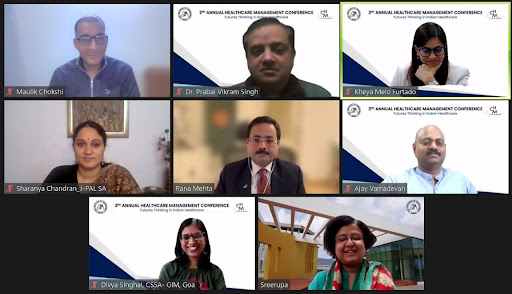PANAJI: Premier B-school, Goa Institute of Management (GIM) hosted its annual healthcare management conference on the theme ‘Futures Thinking in Indian Healthcare’ where domain experts, industry veterans and academicians came together to deliberate on how healthcare delivery in the Indian subcontinent can improve. The common thought which emerged is that the Indian healthcare structure is being revolutionised with the involvement of technology which is fast proving to be a gamechanger, states a press release.
“In India’s healthcare industry, much has changed in the last decade. We will have a younger population in the future, reducing the strain on the industry. Nowadays, technology is an enabler for the healthcare sector which is phenomenal”, said Ajit Parulekar, Director of GIM.
Well-known political scientist and futurist, Prof. Sohail Inayatullah shared an exposition in his keynote address on how healthcare managers can forecast alternative futures and create a strategy to achieve the preferred future by solving problems. “Imagine something impossible today that becomes your vision of tomorrow”, adds Inayatullah.
The panel discussion on “Future of Indian Healthcare – Quo Vadis?” was expertly moderated by Anjan Bose, former President of Philips Healthcare. The discussion touched upon how the involvement of private healthcare providers can partner with the public sector, especially during the COVID-19 pandemic. It also focussed on how the healthcare industry was moving towards a more preventive and predictive way of looking at health and how the diagnosis was also getting stretched on the therapeutic side, where personalised medicine would become an important aspect. The senior leaders from the healthcare domain emphasised that India is already underway in adopting digital health and that with the unique health ID of every citizen, healthcare delivery would undergo a revolution.
To a question asked by GIM student Shuvam Garabadu on what was the future road-map for creating affordability over access in rural areas, one of the panellist, Sandeep Makkar, Managing Director Johnson and Johnson Medical India replied that the high volatility, shortage of skilled human resources, and underdeveloped infrastructure are some of the prevalent issues in the rural markets of India.
“This structure is now being revolutionised by the involvement of technology, which is fast proving to be a gamechanger. Many companies in India developed indigenous products under COVID-19 powered by AI, which has saved costs, time and maximised access. To accelerate skill development, digital technologies are being leveraged through collaborative virtual reality experiences to provide front-line workers with hybrid co-learning with experts from metro cities. The Ayushman Bharat Infrastructure mission aims to co-create more rural health and wellness centres, integrated public health labs, and diagnostic centres through a Public-Private Partnership (PPP) model, resulting in a visionary plan for improving access to affordable, high-quality healthcare for all explained,” added Sandeep Makkar.
The discussion on ‘Making Indian Healthcare Resilient: Health Start-ups & Innovations’ provided insights into how the start-up ecosystem in the country is tackling problems at the grassroots. The discussion was ably moderated by the Director of GIM, Dr. Ajit Parulekar. The discussion focused on how now is the best time to enter the market that startups could bridge the gaps caused by COVID-19 and how the affordability and accessibility of healthcare could be increased along with home-based delivery. The experts on the panel agreed that India has the potential to be a global hub of start-ups. One of the panellists, Amit Mookim, Managing Director, IQVIA South Asia agreed and stated “Today, there is not only an increase in demand but also in supply. Entrepreneurs and corporates are helping jumpstart the healthcare infrastructure market. Growth is happening today in markets that were untapped before.”
The discussion on “Futures Approach in Indian Health Research and Action: Role of Knowledge Networks” garnered deep discussions on how knowledge organisations such as Oxford Policy Management, J-PAL, Access Health International, and GIM are helping healthcare governance in evidence-based policy-making and implementation. The panel emphasised the importance of the private sector in building the healthcare infrastructure and how to build capacity for research. It also stressed the importance to test every policy at small before scaling up to prevent wastage of resources.
The moderator of the session, Dr Kheya Furtado, Associate Professor Goa Institute of Management said, “The trust deficit between the public and the private healthcare system needs to be reduced and they need to collaborate to develop a resilient healthcare system.”
Added Dr Rana Mehta, Healthcare Industry Leader, Partner, PWC – India, “When we had a healthcare problem, we tried to solve it with an economic help book. Had we tried using a healthcare help book, we might have been able to overcome the circumstances of the healthcare sector earlier.”
The conference witnessed over 150 participants who participated in the exchange of ideas between the student community, stakeholders in the industry, academicians and thought leaders.






